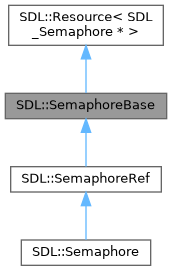A means to manage access to a resource, by count, between threads.
More...
|
| | SemaphoreBase (Uint32 initial_value) |
| | Create a semaphore.
|
| |
| void | Wait () |
| | Wait until a semaphore has a positive value and then decrements it.
|
| |
| bool | TryWait () |
| | See if a semaphore has a positive value and decrement it if it does.
|
| |
| bool | WaitTimeout (std::chrono::milliseconds timeout) |
| | Wait until a semaphore has a positive value and then decrements it.
|
| |
| void | Signal () |
| | Atomically increment a semaphore's value and wake waiting threads.
|
| |
| Uint32 | GetValue () const |
| | Get the current value of a semaphore.
|
| |
|
constexpr | Resource (T resource={}) |
| | Constructs the underlying resource.
|
| |
|
constexpr | Resource (std::nullptr_t) |
| | Equivalent to default ctor.
|
| |
|
constexpr | Resource (std::nullopt_t) |
| | Equivalent to default ctor.
|
| |
|
| Resource (const Resource &other)=delete |
| |
|
| Resource (Resource &&other)=delete |
| |
|
constexpr | Resource (SDL_Semaphore * resource={}) |
| | Constructs the underlying resource.
|
| |
|
constexpr | Resource (std::nullptr_t) |
| | Equivalent to default ctor.
|
| |
|
constexpr | Resource (std::nullopt_t) |
| | Equivalent to default ctor.
|
| |
|
| Resource (const Resource &other)=delete |
| |
|
| Resource (Resource &&other)=delete |
| |
|
Resource & | operator= (const Resource &other)=delete |
| |
|
Resource & | operator= (Resource &&other)=delete |
| |
|
constexpr | operator bool () const |
| | True if contains a valid resource.
|
| |
|
constexpr bool | operator== (const Resource &other) const=default |
| | Comparison.
|
| |
|
constexpr bool | operator== (std::nullopt_t) const |
| | Comparison.
|
| |
|
constexpr bool | operator== (std::nullptr_t) const |
| | Comparison.
|
| |
|
constexpr SDL_Semaphore * | get () const |
| | Return contained resource;.
|
| |
|
constexpr SDL_Semaphore * | release (SDL_Semaphore * newResource={}) |
| | Return contained resource and empties or replace value.
|
| |
|
constexpr const SDL_Semaphore * | operator-> () const |
| | Access to fields.
|
| |
|
constexpr SDL_Semaphore * | operator-> () |
| | Access to fields.
|
| |
Semaphores (specifically, "counting semaphores"), let X number of threads request access at the same time, each thread granted access decrementing a counter. When the counter reaches zero, future requests block until a prior thread releases their request, incrementing the counter again.
Wikipedia has a thorough explanation of the concept:
https://en.wikipedia.org/wiki/Semaphore_(programming)
- Since
- This struct is available since SDL 3.2.0.
- Category:
- Resource
- See also
- Semaphore
-
SemaphoreRef
◆ SemaphoreBase()
| SDL::SemaphoreBase::SemaphoreBase |
( |
Uint32 |
initial_value | ) |
|
|
inline |
This function creates a new semaphore and initializes it with the value initial_value. Each wait operation on the semaphore will atomically decrement the semaphore value and potentially block if the semaphore value is 0. Each post operation will atomically increment the semaphore value and wake waiting threads and allow them to retry the wait operation.
- Parameters
-
| initial_value | the starting value of the semaphore. |
- Postcondition
- a new semaphore or nullptr on failure; call GetError() for more information.
- Since
- This function is available since SDL 3.2.0.
- See also
- SemaphoreBase.Signal
-
SemaphoreBase.TryWait
-
SemaphoreBase.GetValue
-
SemaphoreBase.Wait
-
SemaphoreBase.WaitTimeout
◆ GetValue()
| Uint32 SDL::SemaphoreBase::GetValue |
( |
| ) |
const |
|
inline |
- Returns
- the current value of the semaphore.
- Since
- This function is available since SDL 3.2.0.
◆ Signal()
| void SDL::SemaphoreBase::Signal |
( |
| ) |
|
|
inline |
◆ TryWait()
| bool SDL::SemaphoreBase::TryWait |
( |
| ) |
|
|
inline |
This function checks to see if the semaphore pointed to by sem has a positive value and atomically decrements the semaphore value if it does. If the semaphore doesn't have a positive value, the function immediately returns false.
- Returns
- true if the wait succeeds, false if the wait would block.
- Since
- This function is available since SDL 3.2.0.
- See also
- SemaphoreBase.Signal
-
SemaphoreBase.Wait
-
SemaphoreBase.WaitTimeout
◆ Wait()
| void SDL::SemaphoreBase::Wait |
( |
| ) |
|
|
inline |
◆ WaitTimeout()
| bool SDL::SemaphoreBase::WaitTimeout |
( |
std::chrono::milliseconds |
timeout | ) |
|
|
inline |
This function suspends the calling thread until either the semaphore pointed to by sem has a positive value or the specified time has elapsed. If the call is successful it will atomically decrement the semaphore value.
- Parameters
-
| timeout | the length of the timeout, in milliseconds, or -1 to wait indefinitely. |
- Returns
- true if the wait succeeds or false if the wait times out.
- Since
- This function is available since SDL 3.2.0.
- See also
- SemaphoreBase.Signal
-
SemaphoreBase.TryWait
-
SemaphoreBase.Wait
The documentation for this struct was generated from the following file:

 Public Member Functions inherited from SDL::Resource< SDL_Semaphore * >
Public Member Functions inherited from SDL::Resource< SDL_Semaphore * >